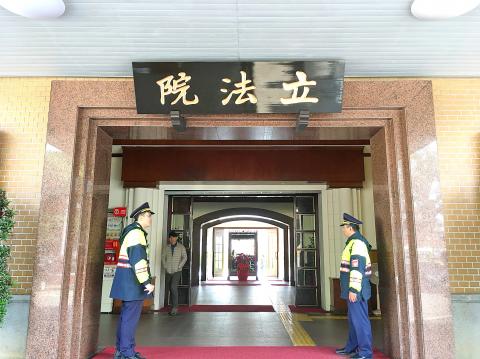A vote on an anti-infiltration bill is likely to take place at the Legislative Yuan in Taipei today after cross-caucus negotiations yesterday failed to reach a consensus.
During yesterday’s talks, which lasted about six hours, Legislative Speaker Su Jia-chyuan (蘇嘉全) said that when the bill is brought up today, each caucus would be given an opportunity to speak and to vote on it.
Chinese Nationalist Party (KMT) Vice Secretary-General Chang Hsien-yao (張顯耀) accused the Democratic Progressive Party (DPP) of rushing the procedure to manipulate the elections on Jan. 11.

Photo: Lin Liang-sheng, Taipei Times
The KMT places great importance on national security and is opposed to foreign infiltration of the Republic of China, but it opposes passage of the bill before the elections, Chang said.
“President Tsai Ing-wen’s (蔡英文) instructions to the Legislative Yuan to pass the bill on Dec. 31 are a violation of the Constitution,” he said.
“The president should be supervised by the Legislative Yuan, but she is telling the legislature to pass a major bill by a deadline,” he said.
The DPP has not put the bill to a public hearing, inspection by committee or cross-party talks, he said, adding that the scope and target of the proposed legislation were unclear.
Such legislation would cause panic and unease among more than 2 million Taiwanese working, studying or doing business in China, as well as among cross-strait exchange organizations, he said.
“Was the DPP sleeping for three years? Has it been ignoring concerns about Chinese infiltration and national security? If not, why has it waited until the last minute to push through this bill?” Chang asked.
At a campaign event in New Taipei City, DPP Chairman Cho Jung-tai (卓榮泰) said that the bill would not target innocent people or those engaged in sporting, cultural, business or other regular exchanges with China.
There is no cause for concern, Cho said, adding that he hoped people would not “make waves or foster unease.”
The bill contains 12 articles, its wording is clear, and its scope tight and carefully defined, while the legislative process surrounding its formulation and passage was transparent, Cho said.
It is needed to counter the actions of foreign forces engaging in illegal activity within the nation’s borders, he said.
Belle Yu (于美人), campaign spokeswoman for People First Party Chairman James Soong (宋楚瑜), said that while Taiwanese hope for an anti-infiltration bill to protect the nation, the current draft was worded unclearly and tries to cover too much.
The bill is too small, with only 12 articles and fewer than 1,000 words, Yu said, adding that it was “a bit sloppy.”
Too much of it has been questioned, she said, adding that the bill should be revised and its contents more clearly explained.
Regular people would worry that their actions would become illegal and that there would be no official channel through which to appeal, she said.
Additional reporting by Lai Hsiao-tung and Wu Su-wei

MAKING WAVES: China’s maritime militia could become a nontraditional threat in war, clogging up shipping lanes to prevent US or Japanese intervention, a report said About 1,900 Chinese ships flying flags of convenience and fishing vessels that participated in China’s military exercises around Taiwan last month and in January last year have been listed for monitoring, Coast Guard Administration (CGA) Deputy Director-General Hsieh Ching-chin (謝慶欽) said yesterday. Following amendments to the Commercial Port Act (商港法) and the Law of Ships (船舶法) last month, the CGA can designate possible berthing areas or deny ports of call for vessels suspected of loitering around areas where undersea cables can be accessed, Oceans Affairs Council Minister Kuan Bi-ling (管碧玲) said. The list of suspected ships, originally 300, had risen to about

DAREDEVIL: Honnold said it had always been a dream of his to climb Taipei 101, while a Netflix producer said the skyscraper was ‘a real icon of this country’ US climber Alex Honnold yesterday took on Taiwan’s tallest building, becoming the first person to scale Taipei 101 without a rope, harness or safety net. Hundreds of spectators gathered at the base of the 101-story skyscraper to watch Honnold, 40, embark on his daredevil feat, which was also broadcast live on Netflix. Dressed in a red T-shirt and yellow custom-made climbing shoes, Honnold swiftly moved up the southeast face of the glass and steel building. At one point, he stepped onto a platform midway up to wave down at fans and onlookers who were taking photos. People watching from inside

Japan’s strategic alliance with the US would collapse if Tokyo were to turn away from a conflict in Taiwan, Japanese Prime Minister Sanae Takaichi said yesterday, but distanced herself from previous comments that suggested a possible military response in such an event. Takaichi expressed her latest views on a nationally broadcast TV program late on Monday, where an opposition party leader criticized her for igniting tensions with China with the earlier remarks. Ties between Japan and China have sunk to the worst level in years after Takaichi said in November that a hypothetical Chinese attack on Taiwan could bring about a Japanese

The WHO ignored early COVID-19 warnings from Taiwan, US Deputy Secretary of Health and Human Services Jim O’Neill said on Friday, as part of justification for Washington withdrawing from the global health body. US Secretary of State Marco Rubio on Thursday said that the US was pulling out of the UN agency, as it failed to fulfill its responsibilities during the COVID-19 pandemic. The WHO “ignored early COVID warnings from Taiwan in 2019 by pretending Taiwan did not exist, O’Neill wrote on X on Friday, Taiwan time. “It ignored rigorous science and promoted lockdowns.” The US will “continue international coordination on infectious